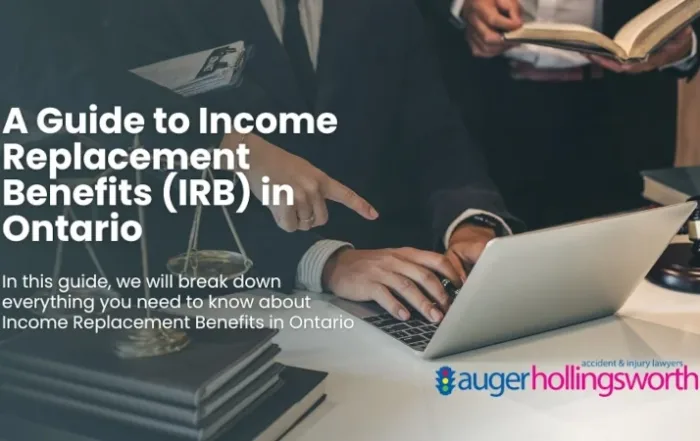Toronto Long Term Disability Denial Lawyers
Have you applied for or been denied disability insurance benefits? Beyond the physical pain you may be going through, having a claim rejected, delayed, or prematurely terminated can burden you and your loved ones with undue stress and anxiety. Too often, injured and disabled people with legitimate claims are denied the benefits they are entitled to under their policies due to technicalities, oversight, lack of proper documentation, or other unfair reasons—and the impact is disastrous. Fully or completely unable to work and without access to these benefits, it can quickly become difficult to support a family and obtain crucial care.
Whether you are filing for the first time or already dealing with a claim denial, do not give up. At Auger Hollingsworth, our experienced disability lawyers regularly help clients get the insurance benefits they deserve. With extensive knowledge of Toronto laws and the disability benefits filing process, we employ whatever legal tools necessary to help you get the support you need. If necessary, we are even prepared to bring legal action against the insurance company to claim your rightful benefits along with any arrears (back pay) you may be owed.
Disability Insurance Plans Available in Toronto
Disability insurance is a type of insurance coverage that supplements your income in the event that you become injured, chronically ill, or otherwise unable to work. As benefits are determined based on salary or wages, only employed persons in Toronto can purchase a disability insurance policy.
Depending on the nature of your work and eligibility, you might obtain benefits through government insurance programs or through private plans. Government disability insurance coverage is available through the province of Ontario’s Workplace Safety and Insurance Board (WSIB), through federal Employment Insurance (EI), and, for those who qualify, through Canada’s Pension Plan (CPP). Both the WSIB and CPP programs also provide certain benefits for the family and other dependents of the policyholder.
Private disability insurance policies may be available through a group plan provided by your employer or purchasable through your union or professional organization or individually purchased directly from an agent or insurer itself. In the case of some employer-provided group disability insurance plans, you may see deductions on your paycheck to help contribute to your premiums. But only the portion of the benefits your employer pays for are taxable; you will not owe taxes on any premiums you pay.
Individual disability insurance policies are also available for anyone to purchase privately. There are many reasons you may choose to purchase an individual plan, such as if your employer-provided coverage is inadequate, if your employer does not provide disability coverage at all if the group plans are available to you via other sources (unions, professional organizations, etc.) are unaffordable, or if you don’t have a direct employer. Individual disability plans allow policyholders to have the utmost control over the coverage they carry, and they offer portability—in other words, the plans are not tied to a specific employer. For this reason, many Canadians enjoy the peace of mind and flexibility of private individual plans.
Most Common Reasons for Long Term Disability Denials
With long-term disability denials, you can be informed that you do not qualify for benefits from the beginning or that you no longer qualify for benefits after a certain period. Some of the most common reasons for denying claims include:
- Injury or condition not considered restrictive enough – You may be informed that your medical condition or injury is not considered serious enough to prevent you from going to work or is excluded from coverage as per the terms of the insurance policy.
- Lack of medical evidence – Some conditions such as psychological conditions, brain injuries or chronic medical conditions like fibromyalgia or chronic fatigue syndrome, have few visible symptoms.
- Material misrepresentation or non-disclosure – Insurance companies frequently attempt to void policies for material misrepresentation or non-disclosure, thereby invalidating a policy.
- Failure to pay premiums – If your policy has lapsed due to non-payment of premiums, you may be ineligible for long-term disability coverage.
- A review of your case after surveillance – Some insurance companies hire private investigators to conduct surveillance without the claimant’s knowledge. Within limits, this is legal and is done to try to catch claimants doing things that they say they can’t do (and therefore undermine their credibility and their claim).
- Breach of a rehabilitation clause – Most long-term disability policies pay benefits as long as you get appropriate treatment for your condition from a qualified physician. Failure to do so may be deemed a breach of the clause.
Types of Disability Insurance
Disability insurance is not all geared around long-term disabilities. It is important to know what type of policy you have and what you are covered for.
The main four types of disability insurance in Ontario are the following:
Long-term disability insurance (LTD)
This is like income protection insurance. If illness or disability renders you unable to return to work, you will be paid a portion of your income. This can help with living expenses, medical treatment, rehabilitation, and so on.
Coverage is normally provided for two years, after which time you are expected to take up any occupation for which you are reasonably qualified (or could become qualified for). Failure to do so can see the withdrawal of long-term disability benefits.
Short-term disability insurance
This is also a form of income insurance protection, providing income replacement if you are unable to work due to a medical condition or injury.
It is usually purchased by employers on behalf of employees but applies regardless of where an injury occurs – it does not have to be in the workplace. Payments are generally made only for the first 120 days of a medical issue.
Critical illness insurance
Critical illness insurance covers you if you are diagnosed with a serious illness such as cancer, stroke, heart disease, heart attack and generally around 10-15 other serious medical conditions.
This cover is paid in one lump sum and is not dependent on whether you return to work or not.
Disability mortgage insurance
If you become disabled and unable to earn an income, disability mortgage insurance ensures that you have the financial support to pay your mortgage.
It generally includes up to a certain amount every two weeks or month and limits on the duration of payments may apply.
Free Consultation with Experienced Toronto Disability Denial Lawyers
If you’ve been injured and can no longer work, and your disability insurance claim has been denied, you need to find a personal injury lawyer you can trust to help you handle your case. Our lawyers Brenda Hollingsworth and Richard Auger have represented clients throughout Ontario since 2004 to ensure they get the compensation they deserve after a severe injury.
Regardless of how badly you were injured, your insurance company will likely try to pay as little as possible, or nothing at all. Which is why working with a disability insurance denial lawyer is so important, to ensure you get the compensation you deserve for your injuries as you adjust to your new life and recover from your injuries.
Contact Auger Hollingsworth as soon as possible after a disability insurance denial to book your free consultation. We’ll meet with you wherever you’re comfortable, whether that’s in our office, in your own home, or in the hospital where you’re recovering.
We put your needs first, and you won’t pay anything unless and until you get a settlement or judgment.
What to Do After a Disability Insurance Denial
Finding yourself injured and unable to work can be confusing, frustrating, and scary. And even more so if your disability insurance claim is denied.
If you find yourself in that position, the first step is not to panic. You’re not out of options, it’s common for insurance companies to try not to pay premiums if they can avoid it, and they may not treat your claim as fairly as they should. Your next step is to contact a long term disability insurance lawyer who can help you to file your appeal.
A lawyer can help you:
- File your appeal.
- Work with vocational experts to get them to testify to the extent of your disability.
- Obtain medical evidence and work with your physician.
- Collect witness statements from the accident or injury.
It’s possible to handle the appeal yourself, but you may end up missing deadlines or falling victim to obscure legal loopholes. It’s best to work with a professional to ensure your claim is filed smoothly and you get the benefits you need. And remember that working with our personal injury lawyers means that you won’t pay us until we get a settlement or judgement for you. Schedule a free consultation today to find out how our experienced personal injury attorneys can help with your appeal.
Requirements for Receiving LTD benefits
Proving that your injuries or illness led to “total disability” is the most important factor for receiving benefits. However, there are some other steps you may need to take to receive LTD benefits from your insurance policy. They include:
- Not letting your insurance lapse while you are trying to receive disability benefits. Make sure you keep paying premiums to keep your insurance.
- In some instances, proving that the injury or illness was not a pre-existing condition.
- Proving that you were a full-time employee at the time your injury or illness occurred.
- Making sure that your injury or illness is not excluded from your insurance policy.
Since each insurance company has its own requirements for being eligible for Long Term Disability benefits, it’s best to have an attorney help you through the process.
Frequently Asked Questions about Long Term Disability Denials |
What is a long-term disability appeal?If your application for long-term disability is denied or your benefits are stopped, you will be informed in writing by the insurer. As part of your notification, you should be informed about how to “appeal” the decision. The key thing to bear in mind is that this appeal is not like a standard legal appeal held in front of a panel of arbitrators or judges. The decision will be made by the same insurance company (and maybe even the same group of people) that denied your claim in the first place. This means that the success rate of such appeals is very disappointing. |
What can you do if your long-term disability claim is denied?If your long-term disability claim is denied, you can appeal but, for reasons covered in the question above, appeals rarely work. Alternatively, you can hire a lawyer and make a legal claim against the insurance company. Once we start the legal process, the insurer is forced to defend the legal claim, which incurs significant costs. Often, the insurance company wants to avoid the extra costs associated with a court case (including legal fees and punitive damages) and will negotiate a settlement with the claimant out of court. Taking legal action is, therefore, often a preferable course of action to lodging an appeal. |
What type of disability typically qualifies for LTD benefits?If an injury or medical condition prevents you from working or performing the tasks required by your current job, your long-term disability insurance policy should cover you regardless of the type of injury or condition. Check your policy to see if it excludes certain illnesses or injuries compensable under a Workplace Safety Insurance Board claim through your employer. |
How long can you claim long-term disability benefits?Long-term disability policies vary in their terms but most last until 65 years of age and some have maximum periods for payment of LTD benefits, such as five or 10 years. Most policies will pay up to two years if you are unable to return to your place of work (the own occupation test), after which you are expected to take up any employment in any occupation for which you are able. If you can show that you are unable to work anywhere, benefits may continue according to the terms of your policy. |
What are your responsibilities during a long-term disability claim?You have certain responsibilities during an LTD claim and these should be made clear to you in the approval letter you receive from the insurance company. You must follow the responsibilities outlined or the insurance company may repudiate your policy and deny or discontinue coverage. Generally speaking, these responsibilities include:
If you have sustained injuries requiring long-term disability benefits and have been denied coverage in Ontario, start by discussing your case during a free case evaluation with a personal injury lawyer at Auger Hollingsworth. |
What Our Clients Say
"I was denied my disability benefits from my insurance provider. I contacted Auger Hollingsworth and from beginning to end, the service was very professional. They continually went above and beyond to help me with my case, and were very patient with my questions. I am very pleased with the result of my case, and I highly recommend them for disability claims, or any of their services. Thank you, Bianca and team!"
Rating: 5/5 ⭐⭐⭐⭐⭐
Consult an experienced lawyer for help with your Toronto disability claim
Whether you are considering your options for purchasing disability insurance, getting ready to file a new disability claim for benefits, or have already had your claim denied at least once, you need a legal professional by your side with a deep understanding of the insurance industry and a proven track record advocating for people with disabilities. At Auger Hollingsworth, our lawyers work tirelessly to protect our clients’ interests. To learn more about how we can help you, call +1 (613) 233-4529 or contact us online and schedule a free assessment of your case today.
More Information about Long Term Disability Denial
For more information, visit one of our blog posts:
- De-Mystifying Long-Term Disability
- What’s the Difference Between Short-Term and Long-Term Disability?
- Do I Need Individual Disability Insurance If I’m Covered By My Group Plan?
- Want to Know More About How To Apply for LTD Benefits?
- What to Keep in Mind When Making an LTD Claim
- Want to Know What to Expect When You Hire a Disability Insurance Lawyer?
- Can an Insurance Company Follow and Videotape Me if I Made a Long-Term Disability Claim?
- I’m Receiving Long-Term Disability Benefits; Can I Still Work?
- I Suffer from Chronic Pain and Was Denied Long-Term Disability Benefits
- Is My Depression Considered a Disability?















